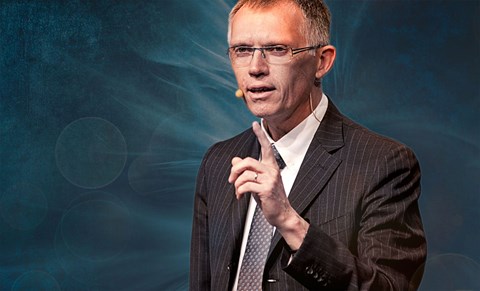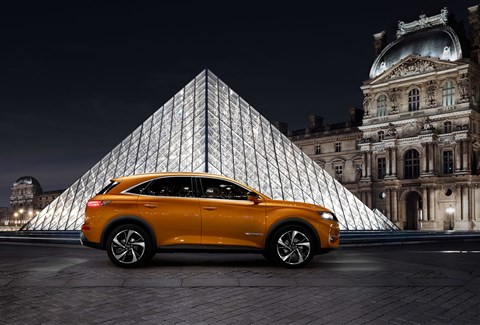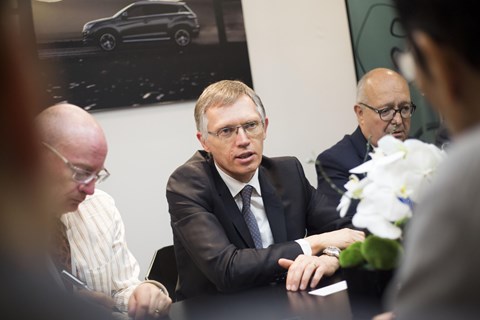► PSA chief Carlos Tavares interview
► He faces the CAR Inquisition
► ‘I learnt business from Carlos Ghosn’
There’s a worrying trend in the motor business to appoint ‘non car guys’ to the top jobs. Some analysts say car guys are too nerdy. Hearts may rule heads. Forget petrol flowing through your veins; what you need are dollars flowing through your brain.
They’ll point to the success of Alan Mulally at Ford, an aeroplane guy from Boeing and self confessed non-petrolhead. Or the late Sergio Marchionne, an accountant who never worked in cars until taking the helm of Fiat in 2004.
Well, Mulally and Marchionne were certainly good for Ford and Fiat. But the case for the ‘car guy’ would cite Carlos Tavares, the mercurial boss of PSA, the Peugeot-Citroën group. No car maker has enjoyed a more spectacular recent turnaround than PSA. Tavares is surely the ultimate car-guy car boss.
He spends 20 weekends a year motor racing. Currently that means a 1983 Ralt RT3 in historic Formula 3 and a 1969 Lola T70 Mk3B with Chevy V8 power in classic endurance racing. He does historic rallying (in a Peugeot 104ZS). He’s a regular at the Nürburgring 24 Hour. ‘Motor racing is a disease,’ he confesses. He spends his spare time tinkering with cars. He owns a classic restoration business in his native Portugal. Somehow he also finds time to run Peugeot, Citroën, DS, Opel and Vauxhall.

He is the one-time protégé at Nissan-Renault of Carlos Ghosn, and for a long time was Ghosn’s number two. While Ghosn awaits trial in Japan, accused of financial wrongdoing, Tavares is the auto exec who can do no wrong.
‘I learnt business focus from Carlos,’ Tavares says. He left in 2013, and took the top job at Peugeot in 2014. At the time, Peugeot was the sick man of European car makers and close to bankruptcy. The year before the affable Lisboan joined, PSA lost €5 billion (£4.45 billion). A year after Tavares’ arrival, Peugeot was profitable. Last year it made €5.6 billion (£5 billion), and had record revenue, sales and profits. ‘Five years on, we are now on the podium of all car makers when it comes to profitability,’ he notes with satisfaction, if not complacency.
Tavares turned around Peugeot with a ‘much sharper business focus, being more demanding of management and staff – we had to push harder – and more external benchmarking.’
The one-time sick man of Europe also bought the perennially unprofitable Opel-Vauxhall, increasing PSA’s size by 35 per cent. A battling company buying a failing company is not advice you’ll find in too many business books.
Opel-Vauxhall had been losing money for 20 years. Under PSA ownership, it turned a profit within 18 months. ‘We reduced fixed costs and variable costs because of economies of scale, and increased our pricing. But a bigger company is only a better and more efficient company if you manage your business better. It’s all about execution.’
He seeks further expansion. ‘We’ll look at new opportunities but above all we want to continue to be a very profitable car company that continues to seek to do more for less. The opportunities will come and go and we’ll select the ones we’re most interested in.’
Including JLR? The rumours say Tata wants to sell and PSA wants to buy. ‘The opportunity is not on the table. Land Rover is interesting. But right now we’re not thinking about it.’

Besides, PSA already has a ‘highly profitable’ premium brand – DS Automobiles, a Tavares creation. The DS 7 Crossback is France’s best-selling premium SUV. Mind you, to get to the pricing and global appeal of BMW or Mercedes ‘could take 30 years’. That’s how long it took Audi, points out Tavares.
Why no successful French premium car maker before, when France dominates in other luxury goods? ‘No car maker in France has been able to combine the emotional creativity with the engineering and financial rigour.’
He also believes that a four-million-cars-a-year maker – where PSA is now – is fine for success. ‘We’re proving it. Bigger is not necessarily better. Agility in this chaotic world raises value. The key is not size. It is to continue to execute our plans in the most efficient way.’
The future is of course electric, and Tavares says making money from EVs will be tough. ‘Clean mobility is going to be more expensive. It’s like organic food. No politician is telling the consumer this but it’s true: new emissions regulations and electric mobility will cost more.’ He expects 30 per cent of all new cars sold in Europe by 2030 will be electrified – battery electrics or plug-in hybrids.
We finish talking motor racing, Tavares’ passion. He’s been racing for almost 40 years and is now 60. ‘I love it as much as ever. I’m maybe taking fewer risks than before and I probably respect my racing cars more. But if I compare my lap times, I’m getting faster. So there’s still potential for improvement. That makes me very happy.’

Six questions only we would ask: Carlos Tavares interview
Tell us about your first car…
‘A ’78 Alfa Alfasud Sprint. My father bought it for me, my reward for graduating.’
What achievement makes you most proud?
‘The turnaround of PSA. I’d also say when I went to America to take care of Nissan in 2009. The US market was collapsing, it was really difficult. We took some unpopular decisions and by 2010 we beat the profit record for Nissan in America.’
What’s the best thing you’ve ever done in a car?
‘I raced a GP2 single-seater; 620bhp and 600kg. It was so fast I couldn’t comprehend the images coming into my eyes.’
Tell us when you screwed up…
‘So many… When I was a young engineer at Renault, I was so focused on getting things done on time I sometimes compromised on quality. I now know you can never compromise on quality.’
Supercar or classic car?
‘I love racing cars, so maybe a GP2 or an old F1 car. Not a supercar. You can’t drive them on the road any more.’
Company curveball… how many times has Peugeot won Le Mans?
‘Three. And do you know how many times we’ve won the Indy 500? Three: 1913, 1916 and 1919.’